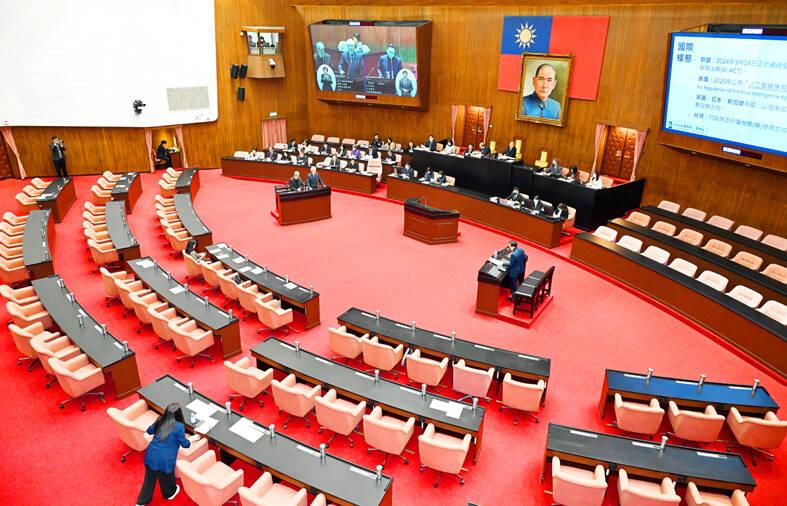Chinese Nationalist Party (KMT) Legislator Hsu Yu-chen (許宇甄) today proposed amendments to Taiwan’s martial law legislation in light of South Korea’s short-lived emergency declaration on Tuesday last week.
Taiwan’s Martial Law Act (戒嚴法), which has not been changed since April 1948, contains large loopholes, Hsu said in a news release.
Hsu’s proposed changes to the Martial Law Act and the Act Governing the Legislative Yuan’s Power (立法院職權行使法) seek to protect Taiwan’s democracy from exploitation by shortening the time frame during which a president’s martial law declaration must be approved by the Legislative Yuan from one month to 24 hours, she said.

Photo: Liao Chen-huei, Taipei Times
South Korean President Yoon Suk-yeol last week suddenly declared martial law and deployed troops to the National Assembly.
After 190 lawmakers voted to reject the motion, Yoon revoked the order within two hours of its announcement.
Hsu said the South Korean parliament’s veto led her to look at Taiwan’s own legislation.
Taiwan’s law states that, after a president has declared martial law, it must be sent to the Legislative Yuan for ratification within one month, she said.
In other words, there is an entire month during which the president could abuse their power, deploy troops and seize political opponents, she said.
The current legislation also does not clarify a process or time period for the Legislative Yuan to examine and deliberate a martial law declaration, she said.
Within two hours of Yoon’s emergency declaration, the South Korean National Assembly gathered to reject the measure, Hsu said.
She therefore drafted an amendment to Article 1 of the Martial Law Act requiring the president to report to the Legislative Yuan within eight hours and enforcing a 24-hour limit for the chamber to examine the proposal and come to a decision, she said.
If a decision is not reached, martial law would not take effect, she said.
Taiwan’s democratic system was hard-earned and must be protected by all Taiwanese to avoid a minority finding loopholes to exploit, she said.
The proposal would be submitted to the Legislative Yuan’s Procedure Committee tomorrow, she said.
The first reading would likely be completed on Friday before being referred to the appropriate committees for examination, she added.
At a separate news conference, Democratic Progressive Party (DPP) caucus chief executive Rosalia Wu (吳思瑤) said that the party has been clear that it opposes any use of martial law.
The KMT is sensationalizing martial law and using it as a political bargaining chip, DPP Legislator Tsai Yi-yu (蔡易餘) added.
The KMT were the instigators of 38 years of martial law in Taiwan, Wu said, questioning the necessity and urgency of discussing the matter, particularly as the main objective of the current session is to pass the government budget.

US President Donald Trump said "it’s up to" Chinese President Xi Jinping (習近平) what China does on Taiwan, but that he would be "very unhappy" with a change in the "status quo," the New York Times said in an interview published yesterday. Xi "considers it to be a part of China, and that’s up to him what he’s going to be doing," Trump told the newspaper on Wednesday. "But I’ve expressed to him that I would be very unhappy if he did that, and I don’t think he’ll do that," he added. "I hope he doesn’t do that." Trump made the comments in

NOT AN OPENING: Trump’s violation of international law does not affect China’s consideration in attacking Taiwan; Beijing lacks capability, not precedent, an official said Taiwanese officials see the US’ capture of the president of Venezuela as a powerful deterrent to Beijing’s aggression and a timely reminder of the US’ ability to defeat militaries equipped with Chinese-made weapons. The strikes that toppled Venezuelan President Nicolas Maduro signaled to authoritarian leaders, including Chinese President Xi Jinping (習近平), US President Donald Trump’s willingness to use military might for international affairs core to US interests, one senior official in Taipei’s security circle said. That reassured Taiwan, the person said. Taipei has also dismissed the idea that Trump’s apparent violation of international law could embolden Beijing, said the official, who was not

A cold surge advisory was today issued for 18 cities and counties across Taiwan, with temperatures of below 10°C forecast during the day and into tonight, the Central Weather Administration (CWA) said. New Taipei City, Taipei, Taoyuan and Hsinchu, Miaoli and Yilan counties are expected to experience sustained temperatures of 10°C or lower, the CWA said. Temperatures are likely to temporarily drop below 10°C in most other areas, except Taitung, Pingtung, Penghu and Lienchiang (Matsu) counties, CWA data showed. The cold weather is being caused by a strong continental cold air mass, combined with radiative cooling, a process in which heat escapes from

Snow this morning fell on Alishan for the first time in seven years, as a strong continental cold air mass sent temperatures plunging across Taiwan, the Central Weather Administration (CWA) said. The Alishan weather station, located at an elevation of about 2,200m in central Taiwan, recorded snowfall from 8:55am to 9:15am, when the temperature dropped to about 1°C, the CWA said. With increased moisture and low temperatures in the high-altitude Alishan area, the conditions were favorable for snow, CWA forecaster Tsai Yi-chi (蔡伊其) said. The last time snow fell at the Alishan weather station was on Jan. 10, 2018, while graupel fell there